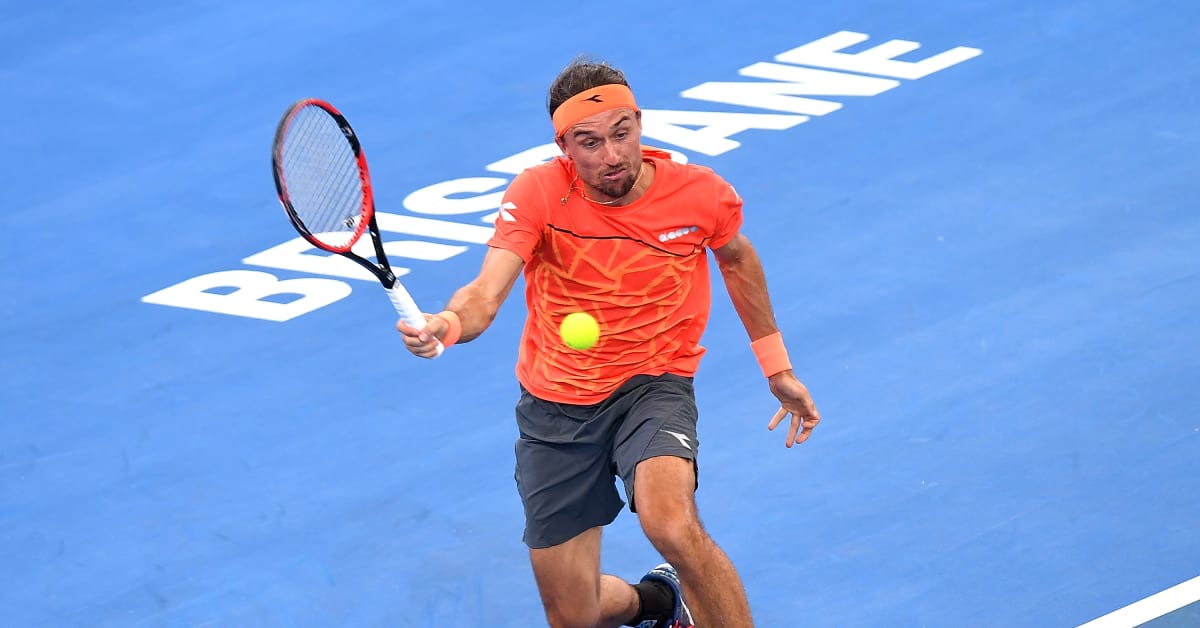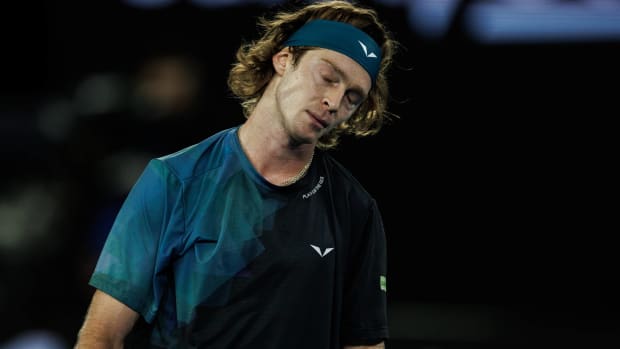Alex Dolgopolov, From ATP to Defending Ukraine: ‘Maybe I’ll Be Killed, Maybe I Have to Kill’
On Sunday, Rafael Nadal, now 35, played in the finals of the BNP Paribas Open, staged in the tennis utopia of Indian Wells, Calif. And, on Sunday, the man who beat Nadal at that event in 2014, now 33, was “carrying protection” and seeking sanctuary at a location he preferred not to disclose near the nucleus of Kyiv. He had to stop our interview multiple times because of disconcerting noises he overheard.
Alex Dolgopolov always punched above his weight. Listed charitably at 5'11" and 157 pounds, the player known by most as “The Dog” compensated with a leaping jackrabbit-y serve and a go-for-broke mentality. He won titles in singles and doubles. He reached No. 13 in the world. He earned more than $7 million in prize money. After a persistent wrist injury forced him to retire last year, he was preparing to transition to a career in business, taking boxing classes to stay fit and enjoying time at home with his girlfriend after circumnavigating the globe for years. “But then,” he says, “there was a change.”
A big one. Last month, his country, Ukraine, was invaded by Russia without provocation. Dolgopolov had enough cash and cachet to avoid service but says he didn’t even consider it. “It was a hard decision as in ‘dangerous,’ but not hard as in ‘difficult.’” As he put it, “We traded a racket and strings for a gun and bullets,” and he enlisted.

A nagging wrist injury forced Dolgopolov to retire from professional tennis in 2021.
Bradley Kanaris/Getty Images
He joined a stacked roster of other Ukrainian athletes—most notably Kyiv Mayor Vitali Klitschko, once boxing’s heavyweight champ—and including two other former tennis players. The year before Dolgopolov beat Nadal, Sergiy Stakhovsky beat Roger Federer on Centre Court at Wimbledon, where Federer was defending his seventh title. Stakhovsky retired from tennis in January at the 2022 Australian Open, feted by some colleagues near the sushi bar in the players’ lounge. Six weeks later, he was in fatigues. (When Russia annexed eastern Ukraine days after the Sochi Games in ’14, Stakhovsky wrote this piece for Sports Illustrated.) Once coached by Dolgopolov’s father, Andrei Medvedev is perhaps best known for cracking the top five and nearly beating Andre Agassi in the finals of the 1999 French Open. At age 47 he, too, decided to defend his homeland.
Dolgopolov’s first challenge was returning home. With talk of war intensifying, he first delivered family members to safety in Turkey. He then connected with someone he describes as “an ex-military person.” Ask Dolgopolov to hit a six-inch target with his serve, he could oblige. Ask him to shoot a rifle and he was clueless. After a week of private training with the former military marksman, he says, “I may not be perfectly ready, but I’m comfortable with weapons now.”
He then left Turkey for Croatia, where he met up with friends. They loaded military gear and supplies into a car and drove north. Dolgopolov met his father near the border, gave him a hug and headed into Kyiv.
He has yet to see combat, but he’s bracing for the worst. He hears the bombs go off. He hears the rockets strafe by. He hears the horror stories coming from Mariupol and Kharkiv, familiar cities where he once played junior tournaments. Most critically, Dolgopolov, who is fluent in Russian, goes on Telegram and hears chatter of Russia’s plans to continue moving west. “Three of these clowns were standing with a map and talking about how they [plan to] invade the other European countries. The world has to know that we are fighting not only for Ukraine but for the world.”
Tennis could scarcely be further from his mind, but he’s heard from countless former colleagues and has strong thoughts on the hot-button tennis issue of whether Russian players should be allowed to compete.
“They’re nice guys, they have nothing to do with it, but my position: This has gotten to a magnitude where Russia is really threatening world war and the death toll is very high—tens of thousands of people. Russian soldiers. The Ukrainian soldiers. Ukrainian civilians,” he says. “They are getting murdered, thousands of them. So this is getting closer to a genocide. And for this, I think that every reaction possible [should be deployed]. I hope tennis will take a stronger stand like FIFA has done.
“I know that Russian players have said ‘No war,’ but no war is not really a strong enough position for me at the moment. I think it’s a weak position. It’s not condemning their country’s actions. If the tennis world wants to keep them playing, they should really publicly condemn their government of doing the wrong actions.
“That is the only way the Russian people can stop [Russian President Vladimir] Putin. And from what we’re seeing now, he has an unbelievably high acceptance level. It’s up to like 70%. They actually think the war in Ukraine is nothing. This is a joke. Their brains are washed with propaganda. If it’s in sports, if it’s with their rich people, with oligarchs, every Russian must feel that something is wrong.”
Similarly, he has a message to the world: “We’re thankful for what we’re getting and we see the people in the countries with us. But we need to push more together, because this guy [Putin]—I don’t think he’s planning to stop, to be honest. … The free countries have to call the bluff.”
During his 15-year career, Dolgopolov, like most athletes, heard the facile metaphors and comparisons between sports and war. The battles and counterattacks and wars of attrition. Now that he’s in the real thing, he struggles to find parallels. “You fight in sport,” he says. “You fight in here, you have to put your life on it.”
So far, he says, he has been lucky. “I can’t tell you how it feels when you’re getting shot at.” He’s not on the front lines, but rather “some territorial defense” to protect his hometown from an invading army.
But that’s today. A year ago, he was living the gilded life of a pro athlete. A month ago, he was a retired athlete holding out hope that the threat of invasion wouldn’t materialize. Now, he hears the bombs go off in the mall where he would shop and is prepared for whatever comes next.
“Maybe I’ll be killed. Maybe I have to kill. What can I say? This is war.”
(Dolgopolov relayed he is open to donations and he “will personally buy and deliver to our defenders armor and needed equipment.” You can contribute using this account name via PayPal.)
More Coverage from SI:





